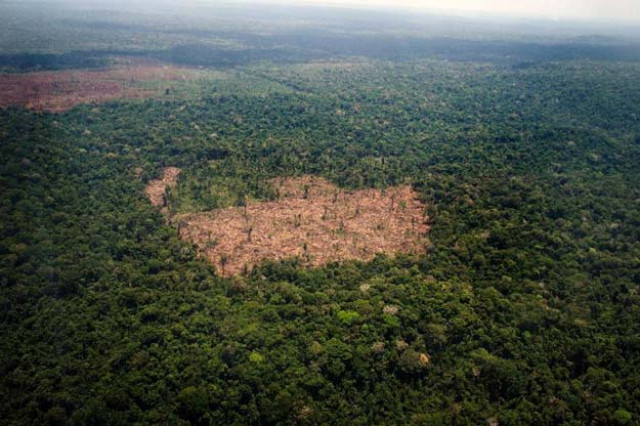Forests to fortune: Journey into carbon credit prosperity
Pakistan lacks technical experts, resources to develop carbon credit proposal as per international standards

The Reducing Deforestation and Degradation (REDD+) initiative has been established at the international level to combat deforestation and forest degradation in the tropics, where the vast majority of forest destruction takes place. Pakistan, being a Non-Annex party to the United Nations Framework Convention on Climate Change (UNFCCC), is also a beneficiary of the REDD+ initiative. REDD+ is a climate change mitigation solution developed by Parties to the UNFCCC, aiming at the implementation of activities by national governments to reduce human pressure on forests that result in greenhouse gas emissions at the national level. As an interim measure, it also recognises subnational implementation. The National REDD+ Strategy has been prepared through extensive stakeholder consultations to develop strategic actions to reduce carbon emissions from deforestation and forest degradation and promote conservation and enhancement of forest carbon stocks and sustainable forest management.
REDD+ is a framework created by the UNFCCC Conference of the Parties (COP) to guide activities in the forest sector that reduce emissions from deforestation and forest degradation, as well as the sustainable management of forests and the conservation and enhancement of forest carbon stocks in developing countries. Carbon credits are a transparent, measurable, and results-based way for companies to support activities such as protecting and restoring irrecoverable natural carbon sinks like forests or marine ecosystems and scaling nascent carbon removal technology to keep global climate goals within reach. Carbon credits are realised when trees absorb carbon from the atmosphere and store it in the tree and soil. For a forestry carbon project to qualify as a verified emissions reduction and be claimed as an offset, stringent rules must be met. Simply stated, this ensures the project will last. REDD credits are transacted in the voluntary market for carbon. Voluntary carbon markets emerged in the mid-1990s, are self-regulated, and exist separately from carbon markets set up by governments in response to the 1997 Kyoto Protocol.
Read Kakar to attend COP-28 in UAE
The aim of REDD+ is to encourage developing countries to contribute to climate change mitigation efforts by: i) reducing greenhouse gas emissions (GHG) by slowing, halting, and reversing forest loss and degradation; and ii) increasing removal of GHGs from the earth’s atmosphere through the conservation, management, and sustainable use. The major thrust of REDD+ in Pakistan includes the reduction of emissions from deforestation, reduction of emissions from forest degradation, conservation of forest carbon stocks, sustainable management of forests, and enhancement of forest carbon stocks. The major three phases of REDD+ are roughly associated with readiness, implementation, and payment for results.
Pakistan, with only 5% of the total land area under forests, initiated REDD+ activities in 2010 to mitigate climate change through reduced carbon emissions from the forestry sector. Pakistan received REDD+ Readiness financial support from the Forest Carbon Partnership Facility (FCPF) of the World Bank for readiness preparations. In Pakistan, REDD+ is an important component supporting the National Climate Change Policy, National Development Vision 2025, and the National Forest Policy. These components, and specifically the preparation of the National REDD+ Strategy (NRS), have gone through the REDD+ readiness process and completed activities under the following four thematic components:
- Readiness Consultation and Organisation,
- Preparation of National REDD+ Strategy,
- Preparation of Forest Reference Emission Level
- Formulation of the National Forest Monitoring System and Safeguard Information System.
As compared to carbon credits that are bought and sold via a cap-and-trade system (Compliance market), carbon offsets are traded on a voluntary market. It includes all businesses and people who aim to decrease their carbon footprint. There are no regulations governing voluntary market participation.
The next steps include the operationalisation of the NRS, resources, or finance mobilisation along with building necessary institutional and stakeholder capacity. This proposal outlines a REDD+ capacity-building programme based on the UN-REDD academy and other forms.
Issues
One of the main challenges in the voluntary carbon markets is the lack of standardisation, integrity, and transparency. Without clear standards for carbon credits, it can be difficult for companies to know whether they are truly reducing their emissions. The most prominent reason why carbon projects fail is that they are not additional, meaning that the project does not contribute to achieving additional climate benefits compared to if the project had not existed. This can happen when carbon credits are issued by protecting forests that were never in danger. Additionally, Pakistan lacks capacity, technical experts, and resources to develop the carbon credit proposal as per the international standards and requirements.
Read more Deforestation vs population growth
Way forward
The Designated National Authority (DNA) of the UNFCCC and Carbon Financing in Pakistan, the Ministry of Climate Change and Environment Coordination, shall focus on the following points aiming at developing and submitting successful carbon credit proposals:
- Invite call for registration and expression of interest for earning carbon credits from forestry, solar, biogas, wind, hydel, and other such renewable resources.
- Develop a database of voluntary and compliance market carbon credit registration in Pakistan at the individual, companies, and corporate level.
- Develop the capacity of the concerned agencies and private sector for developing and processing carbon credit proposals.
- Connect the private sector with overseas buyers and sellers from Pakistan under the voluntary market and display all such listings of international carbon credit buyers on the DNA website.
- Provide all the required services and expertise to the carbon credit earning entities in Pakistan.
THE WRITER IS A CLIMATE CHANGE, FORESTRY, AND ENVIRONMENT EXPERT
Published in The Express Tribune, December 27th, 2023.
Like Business on Facebook, follow @TribuneBiz on Twitter to stay informed and join in the conversation.



















COMMENTS
Comments are moderated and generally will be posted if they are on-topic and not abusive.
For more information, please see our Comments FAQ